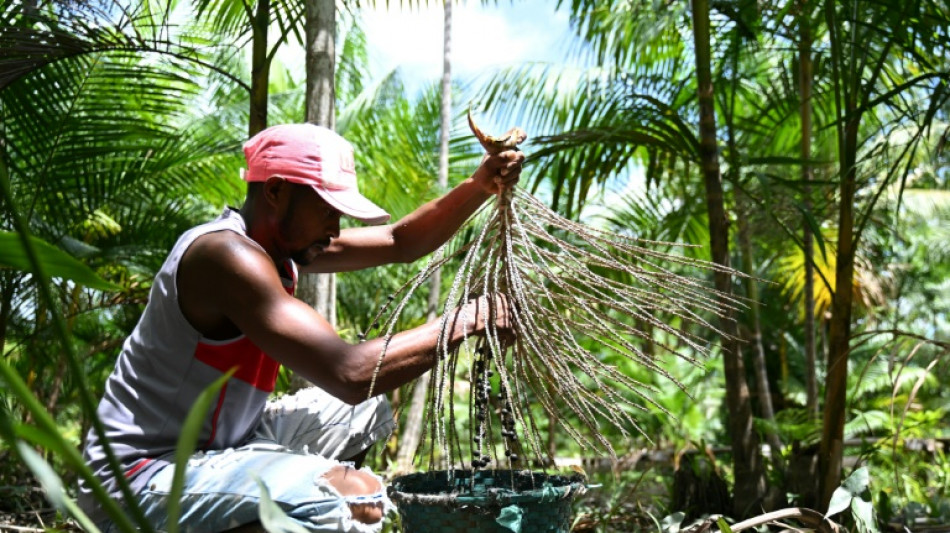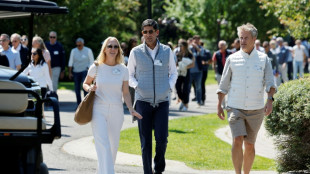
-
 Kremlin says agreed to halt strikes on Kyiv until Sunday
Kremlin says agreed to halt strikes on Kyiv until Sunday
-
Carrick calls for calm after flying start to Man Utd reign

-
 Djokovic to meet Alcaraz in Melbourne final after five-set marathon
Djokovic to meet Alcaraz in Melbourne final after five-set marathon
-
Italian officials to testify in trial over deadly migrant shipwreck

-
 Iran says defence capabilities 'never' up for negotiation
Iran says defence capabilities 'never' up for negotiation
-
UN appeals for more support for flood-hit Mozambicans

-
 Lijnders urges Man City to pile pressure on Arsenal in title race
Lijnders urges Man City to pile pressure on Arsenal in title race
-
Fulham sign Man City winger Oscar Bobb

-
 Strasbourg's Argentine striker Panichelli sets sights on PSG, World Cup
Strasbourg's Argentine striker Panichelli sets sights on PSG, World Cup
-
Jesus 'made love': Colombian president irks Christians with steamy claim

-
 IAEA board meets over Ukraine nuclear safety concerns
IAEA board meets over Ukraine nuclear safety concerns
-
Eurozone growth beats 2025 forecasts despite Trump woes

-
 Dutch PM-elect Jetten says not yet time to talk to Putin
Dutch PM-elect Jetten says not yet time to talk to Putin
-
Social media fuels surge in UK men seeking testosterone jabs

-
 Forest face Fenerbahce, Celtic draw Stuttgart in Europa League play-offs
Forest face Fenerbahce, Celtic draw Stuttgart in Europa League play-offs
-
US speed queen Vonn crashes at Crans-Montana, one week before Olympics

-
 Trump nominates former US Fed official as next central bank chief
Trump nominates former US Fed official as next central bank chief
-
New Dutch government pledges ongoing Ukraine support

-
 Newcastle still coping with fallout from Isak exit, says Howe
Newcastle still coping with fallout from Isak exit, says Howe
-
Chad, France eye economic cooperation as they reset strained ties

-
 Real Madrid to play Benfica, PSG face Monaco in Champions League play-offs
Real Madrid to play Benfica, PSG face Monaco in Champions League play-offs
-
Everton winger Grealish set to miss rest of season in World Cup blow

-
 Trump brands Minneapolis nurse killed by federal agents an 'agitator'
Trump brands Minneapolis nurse killed by federal agents an 'agitator'
-
Arteta focuses on the positives despite Arsenal stumble

-
 Fijian Drua sign France international back Vakatawa
Fijian Drua sign France international back Vakatawa
-
Kevin Warsh, a former Fed 'hawk' now in tune with Trump

-
 Zverev rails at Alcaraz timeout in 'one of the best battles ever'
Zverev rails at Alcaraz timeout in 'one of the best battles ever'
-
Turkey leads Iran diplomatic push as Trump softens strike threat

-
 Zelensky backs energy ceasefire, Russia bombs Ukraine despite Trump intervention
Zelensky backs energy ceasefire, Russia bombs Ukraine despite Trump intervention
-
'Superman' Li Ka-shing, Hong Kong billionaire behind Panama ports deal

-
 Skiing great Lindsey Vonn crashes at Crans-Montana, one week before Olympics
Skiing great Lindsey Vonn crashes at Crans-Montana, one week before Olympics
-
Slot warns Liverpool 'can't afford mistakes' in top-four scrap

-
 Paris show by late Martin Parr views his photos through political lens
Paris show by late Martin Parr views his photos through political lens
-
Artist chains up thrashing robot dog to expose AI fears

-
 Alcaraz outlasts Zverev in epic to reach maiden Australian Open final
Alcaraz outlasts Zverev in epic to reach maiden Australian Open final
-
French PM forces final budget through parliament

-
 French-Nigerian artists team up to craft future hits
French-Nigerian artists team up to craft future hits
-
Dutch watchdog launches Roblox probe over 'risks to children'

-
 Trump brands Minneapolis nurse shot dead by federal agents an 'agitator'
Trump brands Minneapolis nurse shot dead by federal agents an 'agitator'
-
Israel says killed 'three terrorists' in Gaza

-
 After Trump-fueled brawls, Canada-US renew Olympic hockey rivalry
After Trump-fueled brawls, Canada-US renew Olympic hockey rivalry
-
Eileen Gu - Olympic champion who bestrides rivals US, China

-
 Trump, first lady attend premier of multimillion-dollar 'Melania' documentary
Trump, first lady attend premier of multimillion-dollar 'Melania' documentary
-
US Senate eyes funding deal vote as government shutdown looms

-
 Cuddly Olympics mascot facing life or death struggle in the wild
Cuddly Olympics mascot facing life or death struggle in the wild
-
UK schoolgirl game character Amelia co-opted by far-right

-
 Anger as bid to ramp up Malaysia's football fortunes backfires
Anger as bid to ramp up Malaysia's football fortunes backfires
-
Panama court annuls Hong Kong firm's canal port concession

-
 Pioneer African Olympic skier returns to Sarajevo slopes for documentary
Pioneer African Olympic skier returns to Sarajevo slopes for documentary
-
Trump threatens tariffs on nations selling oil to Cuba

| VOD | -0.17% | 14.685 | $ | |
| RYCEF | -2.69% | 16 | $ | |
| RELX | -0.81% | 35.875 | $ | |
| CMSC | -0.21% | 23.645 | $ | |
| BTI | -0.13% | 60.13 | $ | |
| NGG | -0.1% | 84.965 | $ | |
| RIO | -2.64% | 92.68 | $ | |
| AZN | 0.39% | 92.95 | $ | |
| GSK | 1.21% | 51.275 | $ | |
| RBGPF | 1.65% | 83.78 | $ | |
| CMSD | 0.17% | 24.1 | $ | |
| JRI | 0.27% | 12.99 | $ | |
| BP | 0.42% | 38.2 | $ | |
| SCS | 0.12% | 16.14 | $ | |
| BCC | -1.57% | 78.93 | $ | |
| BCE | 0.14% | 25.52 | $ |

Acai berry craze: boon or threat for the Amazon?
Working in the sweltering heat of the Brazilian Amazon, Jose Diogo scales a tree and harvests a cluster of black berries: acai, the trendy "superfood" reshaping the world's biggest rainforest -- for better and worse.
Diogo, 41, who lives in a poor, remote community founded by escaped slaves, is a world away from the upscale supermarket aisles of New York or Tokyo, where berries like these are sold in sorbets, smoothies, juices, powders and pills, popularized by the likes of Gwyneth Paltrow and Meghan Markle.
But he has a front-row view of the changes the acai craze is bringing to the Brazilian Amazon.
Since acai rose to international fame in the 2000s, touted for its rich nutritional and antioxidant properties, it has unleashed an economic boom for traditional farmers in the Amazon region, and been lauded as a way to bring "green development" to the rainforest without destroying it.
But experts say it is also threatening the Amazon's biodiversity, as single-crop fields of acai palms become increasingly common.
Diogo, who lives in the village of Igarape Sao Joao, in the northern state of Para, is building himself a brick house thanks to the money he has made from acai.
"Things get a lot better for us every harvest season," he says, scraping the small berries into a large basket.
He can fill 25 such baskets on a good day, bringing home between 300 and 625 reais ($60 to $128), he says.
The berries are brought by boat to Belem, the state capital, where sweating workers carry huge loads of them to market to be sold as quickly as possible, before the fragile fruit goes bad.
- 'Acai-ification' of the Amazon -
Long eaten by Indigenous groups, acai is a culinary mainstay in northeastern Brazil, eaten with manioc flour or used to accompany fish and other dishes.
Its deep-purple pulp shot to popularity across Brazil over the past two decades, often drunk as juice or made into a sweetened sorbet and served with fruit and granola.
From there, acai went on to win fans worldwide, from the United States to Europe, Australia and Japan, where it can sell from around $5 per bowl to upwards of $20 for a 100-gram packet of organic acai powder.
Brazilian exports of acai and its derivatives surged from 60 kilograms in 1999 to more than 15,000 tonnes in 2021.
Para, the source of 90 percent of Brazil's acai, produced almost 1.4 million tonnes of it in 2021, worth more than $1 billion for the state's economy.
But studies show the expansion of acai palms in the Amazon is causing a loss of biodiversity in some regions by replacing other species.
"Leave nature to its own devices, and you get 50 or maybe 100 acai plants per hectare," says biologist Madson Freitas of the Museu Goeldi research institute in Belem.
"When you go beyond 200, you lose 60 percent of the diversity of other native species."
He has published a study on the phenomenon, which he calls "acai-ification."
The loss of other plant species in turn has a negative effect on acai, which becomes less productive because of a loss of pollinators such as bees, ants and wasps, he says.
Longer dry periods in the Amazon, which may be exacerbated by climate change, are also hurting acai, which tends to grow on land that floods during the rainy season.
- 'Environmental service' -
Freitas, like Diogo, comes from a "quilombo," communities founded by runaway slaves in Brazil in the 17th and 18th centuries.
He says stronger conservation laws and policing are needed to combat single-crop farming -- as well as incentives for farmers to preserve the rainforest.
Salomao Santos, a local leader in Igarape Sao Joao, admits acai's dominance could become a problem.
"Those of us who live in the Amazon know we can't live on one single species," he says.
He recalls the commodity booms and busts of the past, such as sugar cane and rubber.
He wants compensation for quilombo residents and others who preserve the Amazon, whose hundreds of billions of carbon-absorbing trees are a vital resource against climate change.
"We provide a huge environmental service to the world," he says.
J.Bergmann--BTB



